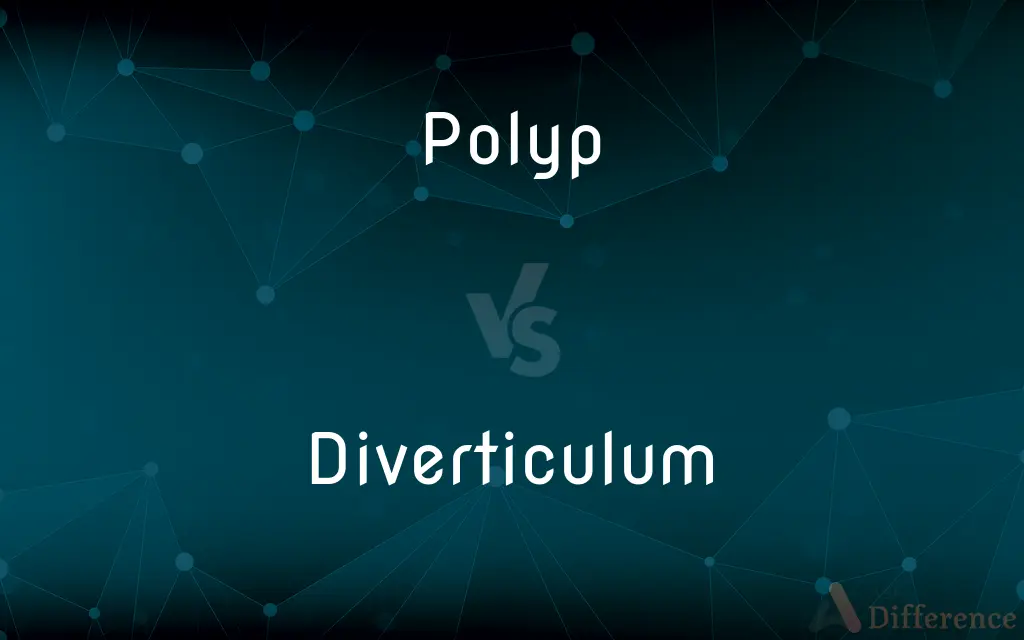Polyp vs. Diverticulum — What's the Difference?
By Maham Liaqat & Fiza Rafique — Updated on April 4, 2024
A polyp is a small growth protruding from a mucous membrane, while a diverticulum is a pouch-like protrusion from a hollow organ's wall.

Difference Between Polyp and Diverticulum
Table of Contents
ADVERTISEMENT
Key Differences
Polyps and diverticula represent different types of abnormal growths within the body, primarily affecting hollow organs but differing significantly in structure and potential health implications. A polyp is a growth that extends from the surface of a mucous membrane, such as those found in the colon, nose, or uterus. These growths are often benign but can sometimes become cancerous. On the other hand, a diverticulum is a bulge or pouch that forms in the wall of a hollow organ, such as the intestine or bladder. Unlike polyps, diverticula do not grow from the organ's surface but instead push outward, creating a pocket or sac.
Polyps are often identified during routine screenings or evaluations for other conditions, as many do not produce symptoms until they reach a significant size or become cancerous. Conversely, diverticula may remain asymptomatic or lead to diverticulitis if they become inflamed, causing pain and other digestive symptoms.
The treatment for polyps generally involves removal, especially if there is a risk of cancer. This is typically done through endoscopic procedures. In contrast, the management of diverticula focuses on preventing inflammation and infection through dietary changes and, in severe cases, may require surgical intervention.
Polyps vary in type, including adenomatous, hyperplastic, and sessile serrated polyps, each with different implications for cancer risk. Diverticula, however, are primarily categorized by their location, such as colonic diverticula in diverticulosis, and whether they are symptomatic or not.
Risk factors for developing polyps include age, family history of polyps or colorectal cancer, and lifestyle factors such as diet and smoking. For diverticula, risk factors also include age, a low-fiber diet, and possibly genetic predispositions, highlighting the influence of both hereditary and environmental factors on these conditions.
ADVERTISEMENT
Comparison Chart
Definition
A small growth protruding from a mucous membrane.
A pouch-like protrusion from a hollow organ's wall.
Location
Commonly found in the colon, nose, and uterus.
Typically occurs in the digestive tract, especially the colon.
Symptoms
Often asymptomatic, but can lead to bleeding or blockages if large.
Often asymptomatic, but can cause pain and digestive issues if inflamed.
Treatment
Usually involves removal to prevent cancer risk.
Focuses on dietary management and, in severe cases, surgery.
Risk Factors
Age, family history, lifestyle factors.
Age, low-fiber diet, genetic predisposition.
Compare with Definitions
Polyp
A polyp is an abnormal tissue growth on a mucous membrane.
Colonoscopies often detect colon polyps before they develop into cancer.
Diverticulum
A diverticulum is a sac-like pouch protruding from an organ's wall.
Diverticula in the colon can lead to diverticulosis.
Polyp
Some polyps can evolve into cancer if not removed.
Regular screening can identify and allow for the removal of precancerous polyps.
Diverticulum
Diet plays a significant role in the formation and management of diverticula.
A high-fiber diet can prevent the formation of diverticula.
Polyp
There are different types of polyps, such as adenomatous and hyperplastic.
Adenomatous polyps have a higher risk of turning into cancer.
Diverticulum
Complications from diverticula can include bleeding and infections.
Severe diverticulitis may require hospitalization and sometimes surgery.
Polyp
The primary treatment for polyps is surgical removal.
Polypectomy during a colonoscopy can effectively remove polyps.
Diverticulum
Management often involves dietary changes and, in severe cases, surgery.
Increasing fiber intake is a common recommendation for diverticulosis management.
Polyp
Polyps often do not cause symptoms in early stages.
Many people discover they have polyps during routine health check-ups.
Diverticulum
Many diverticula cause no symptoms until they become inflamed.
Diverticulitis occurs when diverticula become infected or inflamed.
Polyp
A body form of a cnidarian, such as a hydra or coral, that is cylindrical in shape, has a mouth usually surrounded by tentacles at one end, and is often attached to something at the other end.
Diverticulum
In medicine or biology, a diverticulum is an outpouching of a hollow (or a fluid-filled) structure in the body. Depending upon which layers of the structure are involved, diverticula are described as being either true or false.In medicine, the term usually implies the structure is not normally present, but in embryology, the term is used for some normal structures arising from others, as for instance the thyroid diverticulum, which arises from the tongue.The word comes from Latin dīverticulum, "bypath" or "byway".
Polyp
A usually nonmalignant growth or tumor protruding from the mucous lining of an organ such as the nose, bladder, or intestine, sometimes causing obstruction.
Diverticulum
A pouch or sac branching out from a hollow organ or structure, such as the intestine.
Polyp
(medicine) An abnormal growth protruding from a mucous membrane.
Diverticulum
(anatomy) A small out-pouching of an organ wall such as the large intestine or urinary bladder.
Polyp
(zoology) A cylindrical coelenterate, such as the hydra, having a mouth surrounded with tentacles.
Diverticulum
A blind tube branching out of a longer one.
Polyp
One of the feeding or nutritive zooids of a hydroid or coral.
Diverticulum
A herniation through the muscular wall of a tubular organ (especially the colon)
Polyp
A small vascular growth on the surface of a mucous membrane
Polyp
One of two forms that coelenterates take e.g. a hydra or coral: usually sedentary and has a hollow cylindrical body usually with a ring of tentacles around the mouth
Common Curiosities
What is a diverticulum?
A pouch-like protrusion from the wall of a hollow organ.
What causes diverticula to form?
Factors include age, a low-fiber diet, and genetic predisposition.
How are polyps treated?
Typically, through removal via endoscopic procedures.
Are all polyps cancerous?
No, but some have the potential to become cancerous.
Can polyps turn into cancer?
Yes, some types of polyps can evolve into cancer if not removed.
What is a polyp?
A small tissue growth on a mucous membrane, potentially precancerous.
What are the symptoms of diverticulitis?
Pain, fever, and digestive disturbances.
What dietary changes can prevent diverticula?
A high-fiber diet can help prevent their formation.
How is diverticulosis managed?
With dietary changes and, in severe cases, surgery.
Who is at risk for developing polyps?
Those with a family history of polyps or colorectal cancer, among other factors.
Is diverticulitis curable?
It can be managed effectively, but some may require surgery.
How are polyps detected?
Through routine screenings like colonoscopies.
Can polyps cause symptoms?
Large polyps may cause bleeding or intestinal blockages.
What complications can arise from diverticula?
Inflammation, infection, and in severe cases, bleeding or blockages.
What’s the difference between a polyp and a diverticulum?
A polyp is a growth on a mucous membrane, while a diverticulum is a pouch from the organ's wall.
Share Your Discovery

Previous Comparison
Capuchin vs. Sai
Next Comparison
Communism vs. UtilitarianismAuthor Spotlight
Written by
Maham LiaqatCo-written by
Fiza RafiqueFiza Rafique is a skilled content writer at AskDifference.com, where she meticulously refines and enhances written pieces. Drawing from her vast editorial expertise, Fiza ensures clarity, accuracy, and precision in every article. Passionate about language, she continually seeks to elevate the quality of content for readers worldwide.
















































